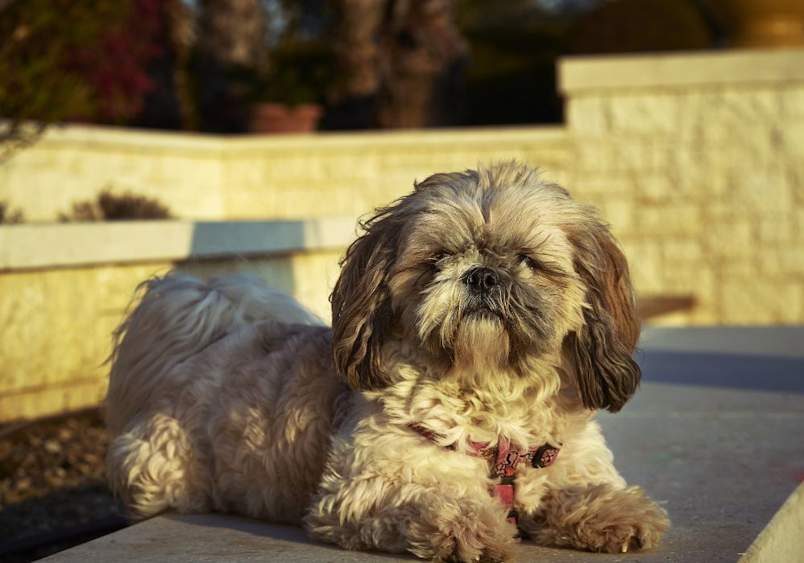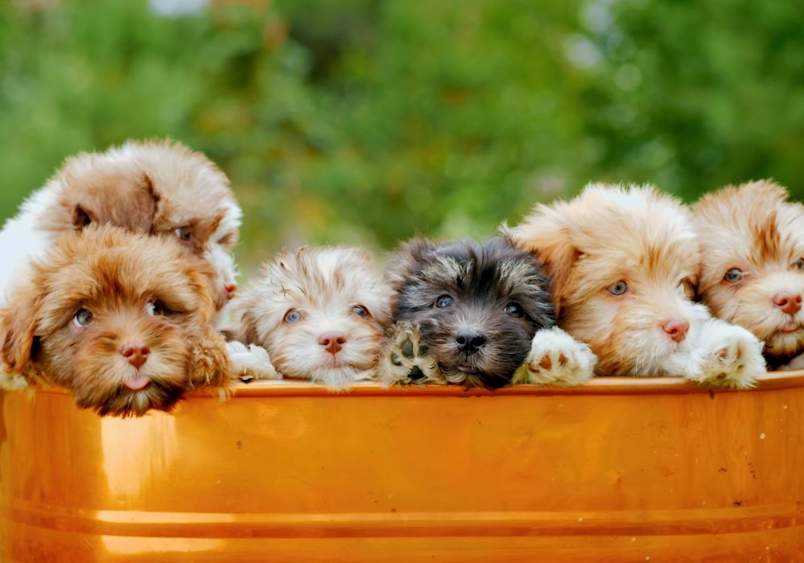
Imagine a dog with the regal grace of a Shih Tzu and the clever wit of a Poodle, all wrapped up in an adorable, fluffy package. Meet the Shih Poo, the delightful hybrid that's been making waves in the world of designer dogs!
These pint-sized pooches are more than just a pretty face. With their teddy bear looks and winning personalities, Shih Poos are quickly becoming the go-to companion for dog lovers of all stripes.
In this guide, we'll unpack everything you need to know about these charming canines. From their cuddly appearance and spirited temperament to their grooming needs and health considerations, we've got you covered. So, if you're considering welcoming a Shih Poo into your home, or you're simply curious about this lovable breed, stick around. You're about to discover why Shih Poo is more than just a cute face.
Quick Facts About the Shih Poo
Name: Shih Poo, Shihpoo, Shipoo, Shih-Poo
Origin: United States (late 20th century)
Size: 8-13 inches tall, 7-20 pounds
Lifespan: 10-15 years
Appearance: Varies, often with a fluffy coat in various colors
Temperament: Friendly, affectionate, playful
Compatibility: Great for families, seniors, and apartment dwellers
Intelligence: Smart and trainable
Exercise & Energy: Moderate energy levels
Grooming Needs: High maintenance, regular grooming required
Training: Responsive to positive reinforcement
Health: Generally healthy, but prone to some inherited conditions
Highlights: Adaptable, loving companion with a teddy bear appearance
What Makes the Shih Poo Great
Perfect for small living spaces: Shih Poos are small dogs that adapt well to apartment living, needing less space to feel comfortable.
Affectionate companions: These pups form strong bonds with their owners and love to cuddle, making them wonderful companions.
Low-shedding coats: While not completely hypoallergenic, Shih Poos shed minimally, which can be helpful for those with mild allergies.
Adaptable to different lifestyles: Shih Poos fit well into various homes, from city apartments to quieter suburban spaces.
Great with kids and other pets: With proper socialization, Shih Poos get along well with children and other animals.
Intelligent and eager to please: Shih Poos are quick learners and respond well to positive reinforcement during training.
Do Shih Poos Look Like their Parent Breeds?
These pups are cuteness personified. Shih Poos tend to have a fluffy, teddy bear-like appearance that you'll instantly fall in love with. In fact, their adorable looks often place them in the popular category of "Teddy Bear Dogs," a group of breeds known for their irresistibly cuddly appearance. The Shih Poo's appearance can vary depending on which parent breed's genes are more dominant.
The Size of a Shih Poo
Shih Poos are small dogs, making them perfect for apartment living or for those who prefer a lap-sized companion. Adult Shih Poos typically stand between 8 to 13 inches tall and weigh anywhere from 7 to 20 pounds, depending on the size of their Poodle parent.
Shih Poo Coats
One of the Shih Poo’s most distinctive features is its coat. It can range from slightly wavy to curly, depending on which parent breed's genes are more prevalent. Their fur can be long and silky like a Shih Tzu's or more tightly curled like a Poodle's. Shih Poos come in a variety of colors, including white, black, brown, gray, and various combinations of these shades.
Shih Poo Behavior and Personality
Shih Poos are known for their delightful personalities, combining the best traits of both parent breeds. When it comes to personality, Shih Poos are truly the whole package. They’re playful, loving, and love to please their people. These pups inherit the Shih Tzu’s love for companionship and the Poodle’s intelligence, making them both cuddly and smart. These little dogs are often described as confident and adaptable, making them great pets for various households.
Are Shih Poos Good with Kids and Other Pets?
When properly socialized, Shih Poos can be an excellent family dog. They're generally patient and gentle with children, but due to their small size, interactions should always be supervised to prevent accidental injury. They're best suited for families with older children who understand how to handle small dogs gently.
Shih Poos Get Along Well with Other Animals
Shih Poos usually get along well with other pets, especially when introduced at a young age. Their friendly nature often extends to other dogs and even cats. However, early socialization is key to ensuring they develop good relationships with other animals.
Caring for Your Shih Poo
Caring for a Shih Poo involves meeting their physical and emotional needs. That takes some effort, especially when it comes to grooming and keeping them entertained. Here’s a quick rundown on what you’ll need to do to keep your pup happy.
Importance of Grooming your Shih Poo
Shih Poos have high grooming needs due to their long, often curly coats. Their curly or wavy coat can easily get tangled or matted if not brushed a few times a week. Many Shih Poo owners take their pups to a professional groomer every 4-6 weeks to keep their coats tidy and manageable. In addition to coat care, maintaining your Shih Poo's overall hygiene is vital. This includes regular nail trimming to prevent discomfort while walking, cleaning their ears to ward off infections, and daily teeth brushing to ensure good dental health. Don't forget to gently wipe their eyes daily, as Shih Poos can be prone to tear staining. These grooming practices not only keep your Shih Poo looking adorable but also contribute to their overall health and well-being.
Are Shih Poos Difficult to Train?
Shih Poos are intelligent dogs that respond well to positive reinforcement training methods. They can be a bit stubborn at times, a trait they may inherit from their Shih Tzu parent, but patience and consistency will yield great results.
Living Needs of a Shih Poo
Shih Poos are adaptable dogs that can thrive in various living situations, from apartments to houses with yards. They don't require a lot of space but do need daily exercise and mental stimulation. A couple of short walks each day, combined with playtime, is usually sufficient to meet their exercise needs.
A Shih Poo’s Diet
A high-quality dog food appropriate for your Shih Poo's age, size, and activity level is essential. Most Shih Poos do well with 2-3 small meals per day. Be cautious not to overfeed, as small dogs can easily become overweight. Always consult with your veterinarian to determine the best diet for your individual Shih Poo.

Shih Poo Health Issues
Shih Poos are typically healthy, but like all breeds, they can be susceptible to certain health conditions inherited from their parent breeds.
What Health Issues Do Shih Poos Commonly Encounter?
Dental Problems
Like many small breeds, Shih Poos can be prone to dental issues. Dental problems can lead to pain, difficulty eating, and even systemic health issues if left untreated. Establishing a dental care routine early in your Shih Poo's life can help prevent these issues.
Eye Problems
Shih Poos may inherit eye conditions such as cataracts or progressive retinal atrophy from their parent breeds. These conditions can affect your dog's vision and quality of life if not addressed.
Patellar Luxation
Patellar Luxation, a condition where the kneecap moves out of place, is common in small breeds. It can cause lameness and pain, and in severe cases, may require surgical correction.
Hip Dysplasia
Hip dysplasia can lead to arthritis and mobility issues as your dog ages. Proper nutrition and exercise, as well as avoiding overfeeding, can help minimize the risk of hip dysplasia. While more common in larger breeds, Shih Poos can sometimes develop this condition.
Allergies
Some Shih Poos may develop skin allergies or food sensitivities. These can manifest as itchy skin, ear infections, or gastrointestinal issues. Identifying and avoiding allergens,whether environmental or food-related, is key to managing this condition. Your vet can help determine the cause and recommend appropriate treatments.
Pet Insurance for Your Shih Poo
Being a responsible Shih Poo owner means planning for both daily care and potential health-related expenses. Because Shih Poos can inherit hereditary conditions from their Shih Tzu and Poodle parents, having pet insurance is an important step in ensuring their long-term health. Get a dog insurance plans that covers breed-specific conditions (excluding pre-existing ones), providing financial protection against the potential costs of hereditary health issues.
The best time to get insurance for your Shih Poo is when they’re still a healthy puppy. Early enrollment ensures you won’t have to worry about pre-existing conditions being excluded from coverage later on.
Along with pet insurance, adding an optional, non-insurance wellness plan can help manage routine expenses like vaccinations, check-ups, and even grooming—which is important for a breed that requires regular pampering. By securing both insurance and wellness coverage, you’re not only protecting your Shih Poo from unexpected health costs but also supporting their overall well-being for years to come.
History of the Shih Poo
The Shih Poo is a relatively new hybrid breed, believed to have originated in the United States in the late 20th century. This mix combines the ancient Shih Tzu, a breed with roots in imperial China, with the intelligent and versatile Poodle, which has its origins in Germany and France.
The goal in creating the Shih Poo was to combine the friendly, affectionate nature of the Shih Tzu with the intelligence and low-shedding coat of the Poodle. While not recognized as an official breed by major kennel clubs, Shih Poos have gained popularity as companion dogs due to their charming personalities and adorable appearance.
Thinking About Getting a Shih Poo?
If you’ve fallen for the Shih Poo’s charms, it’s important to acquire your new pet responsibly.
When looking for a Shih Poo puppy, it's essential to find a reputable breeder who prioritizes the health and well-being of their dogs. A responsible breeder will provide health clearances for both parent breeds, ensuring that the puppies come from healthy lines. They should also allow you to meet the puppy’s parents, or at least the mother, so you can get a sense of temperament and care. Puppies should be raised in a clean, loving environment, and the breeder should be knowledgeable about the breed, ready to answer all your questions thoroughly. Choosing the right breeder is key to finding a healthy, happy Shih Poo.
Alternatively, consider adoption. Shih Poos sometimes end up in shelters or rescue organizations. Adopting an adult Shih Poo can be a great option, as their personality is already developed, and you can often get a clearer picture of their health status.
Remember, regardless of where you get your Shih Poo, schedule a veterinary check-up soon after bringing them home. This will help ensure your new furry friend starts their life with you on a healthy note.
Frequently Asked Questions About Shih Poos
Are Shih Poos hypoallergenic?
While no dog is truly 100% hypoallergenic, Shih Poos are often considered a good choice for allergy sufferers. They typically shed less than many other breeds, which can reduce the amount of allergens in the environment. However, individuals with severe allergies should spend time with a Shih Poo before bringing one home.
How much exercise does a Shih Poo need?
Shih Poos have moderate exercise needs. A couple of short walks daily, combined with playtime, is usually sufficient. However, they enjoy activities and can adapt to more active lifestyles if needed.
Are Shih Poos easy to train?
Yes, Shih Poos are generally intelligent and eager to please, which can make them relatively easy to train. However, they can inherit some stubbornness from their Shih Tzu parent.
Do Shih Poos bark a lot?
Shih Poos can be somewhat vocal, a trait often inherited from their Shih Tzu parent. Early training can help manage excessive barking. Despite their small size, they can make good watchdogs, alerting their owners to newcomers.
How long do Shih Poos live?
On average, Shih Poos have a lifespan of 10 to 15 years. With proper care, nutrition, and regular veterinary check-ups, many Shih Poos live well into their teens.